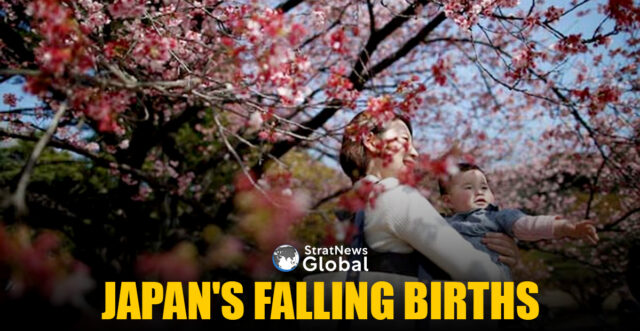Japan’s birth rate hit a record low in 2024, with only 720,988 babies born, marking the ninth consecutive annual decline, the health ministry reported on Thursday, highlighting the country’s rapidly ageing and shrinking population.
Japan‘s birth rate was down 5% in 2024, despite a range of steps unveiled in 2023 by former Prime Minister Fumio Kishida to boost childbearing, while a record number of 1.62 million deaths meant that more than two people died for every new baby born.
South Korea’s Births Rise
Although the fertility rate in neighbouring South Korea rose in 2024 for the first time in nine years, thanks to measures to spur young people to marry and have children, the trend in Japan has yet to show an upturn.
Behind Japan’s childbirth decline are fewer marriages in recent years, stemming from the COVID-19 pandemic, said Takumi Fujinami, an economist at the Japan Research Institute.
Although the number of marriages edged up 2.2% to 499,999 in 2024, that came only after steep declines, such as a plunge of 12.7% in 2020.
Lasting Economic Impact
“The impact could linger on in 2025 as well,” Fujinami said.
Unlike some Western countries, only a few of every 100 babies in Japan are born out of wedlock, suggesting a stronger correlation between marriages and births.
Asked about the latest demographic data, Prime Minister Shigeru Ishiba noted the rise in the number of marriages.
“We need to be aware the trend of falling births has not been arrested. But the number of marriages posted an increase. Given close ties between the number of marriages and the number of births, we should focus on this aspect as well,” he said.
News this week that South Korea’s fertility rate rose to 0.75 in 2024 from 0.72 in 2023 suggested the demographic crisis there might have turned a corner.
Declining Fertility Rate
In Japan, the most recent data shows the corresponding figure for the average number of babies a woman is expected to have during her reproductive life came in at 1.20 in 2023.
While Fujinami said it was too early for any meaningful comparison between the figures in the two countries, it was important for both to improve job opportunities and close the gender gap to encourage young people to marry and have children.
Experts believe South Korea’s positive turn resulted from government support in work-family balance, childcare and housing, as well as a campaign for businesses to nudge employees towards parenthood.
(With inputs from Reuters)





